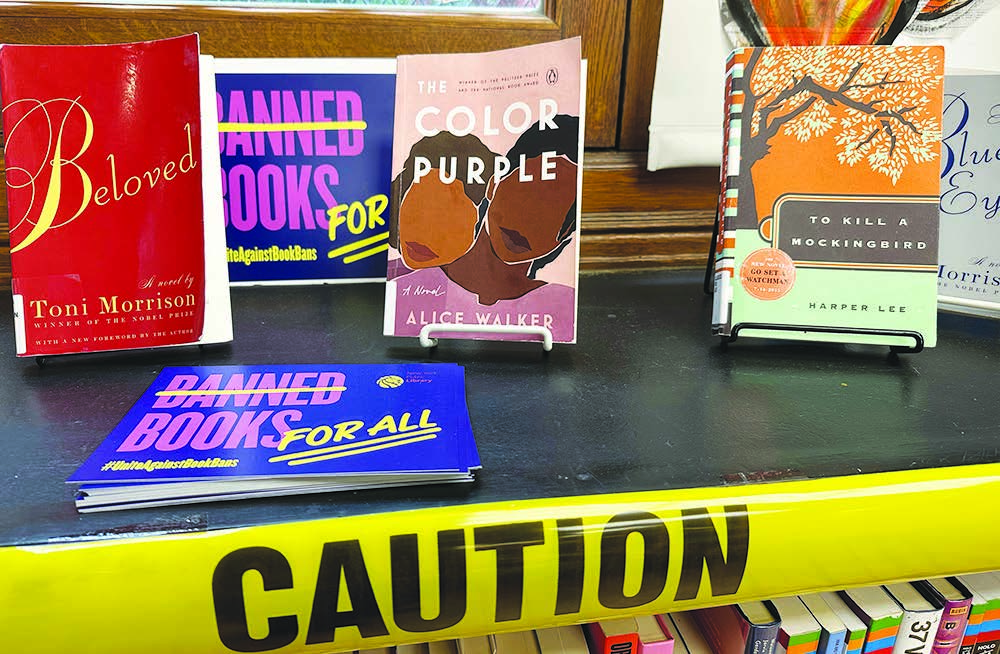Proposed legislation to limit book bans in Nevada libraries advances in state Assembly
FREE SPEECH

TED SHAFFREY / ASSOCIATED PRESS FILE (2023)
A Banned Books Week display is shown in 2023 at the Mott Haven branch of the New York Public Library in the Bronx borough of New York City.
A Banned Books Week display is shown in 2023 at the Mott Haven branch of the New York Public Library in the Bronx borough of New York City.

SUN FILE (2021)
A large picture mural is seen inside the library at the George E. Harris Elementary School. A bill before the Nevada Legislature requires people seeking book bans from school or public libraries in Nevada to make a challenge in court, which must rule the book meets the legal definition of “obscene” to be removed.
A large picture mural is seen inside the library at the George E. Harris Elementary School. A bill before the Nevada Legislature requires people seeking book bans from school or public libraries in Nevada to make a challenge in court, which must rule the book meets the legal definition of “obscene” to be removed.
Editor’s note: Este artículo está traducido al español en la página 8.
A bill that would make book bans harder to achieve in Nevada’s school and public libraries passed its first hurdle toward becoming law.
Assembly Bill 416, which limits removal of library materials and protects librarians from criminal, civil or workplace repercussions for making materials available, cleared the Assembly Judiciary Committee last week and now moves to the full Assembly.
AB 416 requires people seeking book removals to challenge them in courts, which must rule the book meets the legal definition of “obscene.”
Only residents living in the school district with children attending the school with the targeted book would be able to file challenges, under the legislation.
The bill also makes it a felony to harass or harm people for accessing or making library materials accessible.
Carson City father Brandon MacDougall told lawmakers he trusted school librarians to choose appropriate materials for his children.
“I want my children exposed to diverse stories that educate and validate,” he said. “Fighting book bans upholds the Constitutional right to freedom of information and holds back authoritarianism.”
“Somehow, after putting a stop to fascist regimes during the Second World War, we’ve allowed fascism to emerge here in the United States,” MacDougall told the Assembly Judiciary Committee April 8. “Book bans fit right into the fascist playbook and should never be part of our discourse.”
Assemblymember Brittney Miller, a Las Vegas middle school teacher and Democrat sponsoring AB 416, called her bill “a labor of love, and democracy and liberty.” It prohibits municipal, school and library boards, employees and volunteers from limiting access to library materials by removing them, concealing them, defacing them or labeling them as “objectionable.” The bill maintains age recommendations and children’s departments.
Miller said courts should handle book ban requests because local committees and boards lack consistency — the Clark County School District requires a library selection and review committee at each of its more than 350 schools.
Reno municipal librarian Debi Stears said she read 27 books that people wanted removed from Washoe County library shelves in fall 2023.
“I did not find stories of obscenity, as the challengers alleged,” Stears said. “Instead, I found stories of immigrant children trying to find how they fit with the American dream, stories of young people grappling with their identity.”
She called it “absurd” that librarians would circulate obscene materials, noting courts rule materials obscene before curators can purchase them.
According to U.S. Supreme Court precedent, obscenity follows a three-pronged approach: The work must lack serious literary, artistic, political or scientific value. An average person must decide the work appeals to “prurient” interest. It must lewdly exhibit genitals or depict sexually explicit acts in a “patently offensive way.” The high court specified that sex is not synonymous with obscenity.
“These coordinated attacks by political groups have taken up inordinate amounts of time,”
Stears said. “They cherry-pick passages and claim this harms children. We need to preserve parents’ rights to determine what’s appropriate for their own children, not enable political theater by people without children in our schools or using our libraries.”
Yerington resident Summer Merrill said she read “Anne of Green Gables,” “Little House on the Prairie,” “The Baby-Sitters Club” and “Ramona Quimby” series as a child and appreciated seeing herself in girl protagonists.
As she grew older, she sought connections with different characters through books.
“Everyone has a story to tell, and when we start to debate whose stories are worth preserving, we are debating who is worth preserving,” she said.
Philomena Polefrone, associate director of American Booksellers for Free Expression, wrote to the judiciary committee that bans typically begin in school libraries before spreading to public libraries and independent bookstores.
“While it may not seem necessary now, this bill aims to disrupt a playbook that will come to Nevada eventually unless preempted,” she wrote.
Opponents described books with diverse content as “sexualizing” children and “grooming” them for abuse. Several read passages from controversial books aloud.
Lorena Biassotti, a Clark County School Board member who left the local chapter of Moms For Liberty but remains a vocal conservative, said the proposed legislation would obstruct concerned parents who are “facing an epidemic of sexual impropriety in our schools.” She accused lawmakers of undermining parents and “eroding the love and authority we have over our children.”
Commenter Leslie Quinn claimed a ban on bans “is a doorway for children with being OK with being sex trafficked.”
Without naming individuals, Miller noted that several people who supported another First Amendment-oriented bill requiring government to keep nonprofit donors’ personal information confidential spoke against her anti-book banning bill.
“It is actually the same First Amendment,” she said.
The Assembly Education Committee also passed AB 445 on Friday, which protects public and school librarians from criminal liability for making materials accessible. The bill now awaits consideration by the full Assembly, with the date to be determined. hillary.davis@gmgvegas.com / 702-990-8949 / @HillaryLVSun
A bill that would make book bans harder to achieve in Nevada’s school and public libraries passed its first hurdle toward becoming law.
Assembly Bill 416, which limits removal of library materials and protects librarians from criminal, civil or workplace repercussions for making materials available, cleared the Assembly Judiciary Committee last week and now moves to the full Assembly.
AB 416 requires people seeking book removals to challenge them in courts, which must rule the book meets the legal definition of “obscene.”
Only residents living in the school district with children attending the school with the targeted book would be able to file challenges, under the legislation.
The bill also makes it a felony to harass or harm people for accessing or making library materials accessible.
Carson City father Brandon MacDougall told lawmakers he trusted school librarians to choose appropriate materials for his children.
“I want my children exposed to diverse stories that educate and validate,” he said. “Fighting book bans upholds the Constitutional right to freedom of information and holds back authoritarianism.”
“Somehow, after putting a stop to fascist regimes during the Second World War, we’ve allowed fascism to emerge here in the United States,” MacDougall told the Assembly Judiciary Committee April 8. “Book bans fit right into the fascist playbook and should never be part of our discourse.”
Assemblymember Brittney Miller, a Las Vegas middle school teacher and Democrat sponsoring AB 416, called her bill “a labor of love, and democracy and liberty.” It prohibits municipal, school and library boards, employees and volunteers from limiting access to library materials by removing them, concealing them, defacing them or labeling them as “objectionable.” The bill maintains age recommendations and children’s departments.
Miller said courts should handle book ban requests because local committees and boards lack consistency — the Clark County School District requires a library selection and review committee at each of its more than 350 schools.
Reno municipal librarian Debi Stears said she read 27 books that people wanted removed from Washoe County library shelves in fall 2023.
“I did not find stories of obscenity, as the challengers alleged,” Stears said. “Instead, I found stories of immigrant children trying to find how they fit with the American dream, stories of young people grappling with their identity.”
She called it “absurd” that librarians would circulate obscene materials, noting courts rule materials obscene before curators can purchase them.
According to U.S. Supreme Court precedent, obscenity follows a three-pronged approach: The work must lack serious literary, artistic, political or scientific value. An average person must decide the work appeals to “prurient” interest. It must lewdly exhibit genitals or depict sexually explicit acts in a “patently offensive way.” The high court specified that sex is not synonymous with obscenity.
“These coordinated attacks by political groups have taken up inordinate amounts of time,”
Stears said. “They cherry-pick passages and claim this harms children. We need to preserve parents’ rights to determine what’s appropriate for their own children, not enable political theater by people without children in our schools or using our libraries.”
Yerington resident Summer Merrill said she read “Anne of Green Gables,” “Little House on the Prairie,” “The Baby-Sitters Club” and “Ramona Quimby” series as a child and appreciated seeing herself in girl protagonists.
As she grew older, she sought connections with different characters through books.
“Everyone has a story to tell, and when we start to debate whose stories are worth preserving, we are debating who is worth preserving,” she said.
Philomena Polefrone, associate director of American Booksellers for Free Expression, wrote to the judiciary committee that bans typically begin in school libraries before spreading to public libraries and independent bookstores.
“While it may not seem necessary now, this bill aims to disrupt a playbook that will come to Nevada eventually unless preempted,” she wrote.
Opponents described books with diverse content as “sexualizing” children and “grooming” them for abuse. Several read passages from controversial books aloud.
Lorena Biassotti, a Clark County School Board member who left the local chapter of Moms For Liberty but remains a vocal conservative, said the proposed legislation would obstruct concerned parents who are “facing an epidemic of sexual impropriety in our schools.” She accused lawmakers of undermining parents and “eroding the love and authority we have over our children.”
Commenter Leslie Quinn claimed a ban on bans “is a doorway for children with being OK with being sex trafficked.”
Without naming individuals, Miller noted that several people who supported another First Amendment-oriented bill requiring government to keep nonprofit donors’ personal information confidential spoke against her anti-book banning bill.
“It is actually the same First Amendment,” she said.
The Assembly Education Committee also passed AB 445 on Friday, which protects public and school librarians from criminal liability for making materials accessible. The bill now awaits consideration by the full Assembly, with the date to be determined. hillary.davis@gmgvegas.com / 702-990-8949 / @HillaryLVSun

